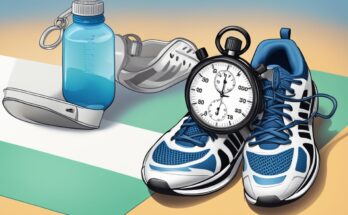If you’re an avid runner and you’re finding that your stamina is lower than usual, you’re not alone. Many runners experience a decrease in their endurance, which can be frustrating and discouraging. However, there are a number of reasons why your stamina may be low, and identifying the cause can help you take steps to improve your performance.
One of the most common reasons for low stamina in running is simply not training enough. If you’re not consistently challenging yourself with longer runs or higher intensity workouts, your endurance will suffer. Another factor that can impact your stamina is your diet. Eating a balanced diet with plenty of complex carbohydrates, lean protein, and healthy fats can help fuel your runs and keep you feeling energized.
Other factors that can contribute to low stamina include dehydration, lack of sleep, and stress. By addressing these issues and making changes to your training and nutrition, you can work towards improving your stamina and achieving your running goals.
Factors Affecting Stamina
Stamina can be affected by various factors, including:
- Diet: A balanced diet is essential for maintaining good health and stamina. Lack of proper nutrients and hydration can lead to fatigue and low stamina.
- Exercise: Regular exercise can help improve stamina. However, over-exercising or not exercising enough can have the opposite effect and lead to low stamina.
- Sleep: Getting enough sleep is crucial for maintaining good health and stamina. Lack of sleep can lead to fatigue and low energy levels.
- Stress: Stress can have a negative impact on stamina. High-stress levels can lead to fatigue and a lack of motivation to exercise.
- Medical conditions: Certain medical conditions, such as anemia or thyroid problems, can lead to low stamina. It is important to consult a healthcare professional if you suspect you may have a medical condition affecting your stamina.
It is essential to identify the factors that may be affecting your stamina and take steps to address them. Making small changes to your diet, exercise routine, and sleep habits can help improve your stamina and overall health.
Common Mistakes in Running
Running is a great way to improve endurance, but it’s not uncommon for runners to experience low stamina during their runs. One of the reasons for this could be due to common mistakes in running.
Inadequate Warm-Up
One of the most common mistakes runners make is skipping their warm-up routine. Warming up before a run helps to increase blood flow, loosen up the muscles and joints, and prepare the body for the physical activity. Skipping the warm-up can lead to fatigue and low stamina during the run.
Improper Breathing Techniques
Breathing is an essential part of running, and improper breathing techniques can lead to low stamina. Many runners tend to hold their breath or take shallow breaths while running, which can cause fatigue and low energy levels. It’s important to practice proper breathing techniques while running, such as taking deep breaths from the diaphragm.
Overtraining
Another common mistake runners make is overtraining. While it’s important to challenge yourself during runs, overtraining can lead to fatigue and low stamina. It’s important to give your body enough time to rest and recover between runs and to gradually increase your mileage and intensity.
Inadequate Hydration and Nutrition
Proper hydration and nutrition are essential for maintaining stamina during runs. Dehydration can lead to fatigue and low energy levels, while inadequate nutrition can lead to muscle fatigue and weakness. It’s important to drink enough water and consume a balanced diet with adequate carbohydrates and protein to fuel your runs.
By avoiding these common mistakes and practicing proper running techniques, you can improve your stamina and endurance during runs.
Tips to Improve Stamina
Improving your stamina is essential if you want to run longer distances without feeling tired. Here are some tips that can help you to improve your stamina:
- Start Slowly: If you are new to running, start slowly and gradually increase your distance and speed. This will help your body to adapt to the demands of running, and you will be less likely to get injured.
- Include Interval Training: Interval training involves alternating between high-intensity and low-intensity exercises. This type of training can help you to build endurance and improve your overall fitness level.
- Focus on Breathing: Proper breathing techniques can help you to improve your stamina. Breathe in through your nose and out through your mouth. Try to breathe deeply and rhythmically.
- Stay Hydrated: Dehydration can lead to fatigue, cramps, and other problems that can affect your stamina. Drink plenty of water before, during, and after your runs.
- Eat a Balanced Diet: Eating a balanced diet that includes plenty of fruits, vegetables, lean proteins, and whole grains can help you to improve your stamina. Avoid foods that are high in sugar, fat, and processed ingredients.
By following these tips, you can improve your stamina and enjoy longer, more satisfying runs. Remember to listen to your body and take breaks when you need them. With time and practice, you can achieve your running goals and feel more confident and energized than ever before.
Conclusion
Low stamina in running can be caused by several factors, including poor nutrition, lack of sleep, and inadequate training. It is important to identify the root cause of low stamina to address the issue effectively.
One common reason for low stamina is a lack of proper nutrition. Consuming a balanced diet that includes carbohydrates, protein, and healthy fats can provide the body with the necessary energy to sustain physical activity.
Inadequate sleep can also contribute to low stamina. Getting enough restful sleep is crucial for the body to repair and recover, which can improve overall stamina and endurance.
Finally, inadequate training can lead to low stamina. Gradually increasing the intensity and duration of workouts can help build endurance and stamina over time.
By addressing these factors and making necessary changes, individuals can improve their stamina and enjoy running and other physical activities with greater ease and endurance.




